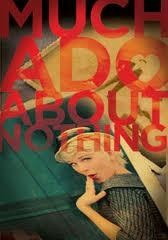
November 10, 2011, by Peter Kirwan
Much Ado About Nothing (Mappa Mundi/Theatr Mwldan) @ Lakeside Arts Centre
Writing about web page http://www.mappa-mundi.org.uk/current-shows
Expectations were set high by Welsh company Mappa Mundi’s self-description of its work: "gloriously irreverent, populist and accessible." A fun-loving Much Ado is always to be welcomed, and the setting – Britain between the wars, a culture where women have been taking on traditional men’s roles – offered an interesting take on the traditional war between the sexes.
In the event, the production offered little in the way of irreverence, although populist and accessible it certainly was. This was a straight and surprisingly sober Much Ado that presented the play clearly and amusingly, but too often was just a little dull.
The small company (nine actors) made for some odd casting decisions, particularly as John Cording’s Leonato ended up trying to marry Hero and Claudio himself, and interrupting his own questions. Conrade, Ursula, Antonio, Balthasar and the Watch (apart from Dogberry and Verges) were all cut, and as a result lead characters ended up making some uncharacteristic decisions: Claudio sang for the prince, and Benedick was the one who came up with the plan to conceal Hero.
In the latter case, this was particularly indicative of the rather serious portrayal of Benedick – and, indeed, Beatrice – in this production. For the first time I’ve ever seen, no-one laughed at the line "Kill Claudio", which came naturally out of a much weightier connection between the two. Liam Tobin and Lynne Seymour were rarely laugh-out-loud funny, and the overhearing scenes were particularly tortured, as the two crawled about the stage holding chairs above their heads and similar. The banter was reasonably snappy, but what instead emerged was a maturer, quieter relationship.
The wartime setting ultimately translated to little more than Beatrice wearing trousers and the recasting of Dogberry and Verges as women, who cackled comically over handbags and "naughty" villains as they played at being police. However, it lent a weariness to proceedings that saw men and women alike looking for companionship. For Beatrice and Benedick, conflict was a slow delay to their getting together; for Gwawr Loader’s Hero and Robin Waters’s Claudio, it was a more serious betrayal of trust at a time when people needed nothing more than someone to trust.
As such, the better parts of the production were those that touched on the edgier aspects of the play. Claudio’s hatred for a distraught Hero was topped only by Leonato’s shocking rage at his fallen daughter, although the culpability of Don Pedro and Claudio was mitigated by Borachio’s wooing of Margaret being staged, with Margaret carefully positioned so the onlookers could not get a clear sight, and a gratuitous "You are my Hero" was added. More interesting was Don Pedro’s proposal to Beatrice, which was played as a genuine spontaneous decision, and was met with Beatrice’s hysterical laughter, to Pedro’s embarrassment.
The production was nothing more than occasionally interesting, though. It rarely sparked, its gentle humour not making up for a lack of bite in the barbs. Yet its aims for lightness meant that it was never able to capitalise on its more interesting edges. As an accessible, clear touring Much Ado, this was ideal, but it never transcended those very modest aims.
No comments yet, fill out a comment to be the first

Leave a Reply